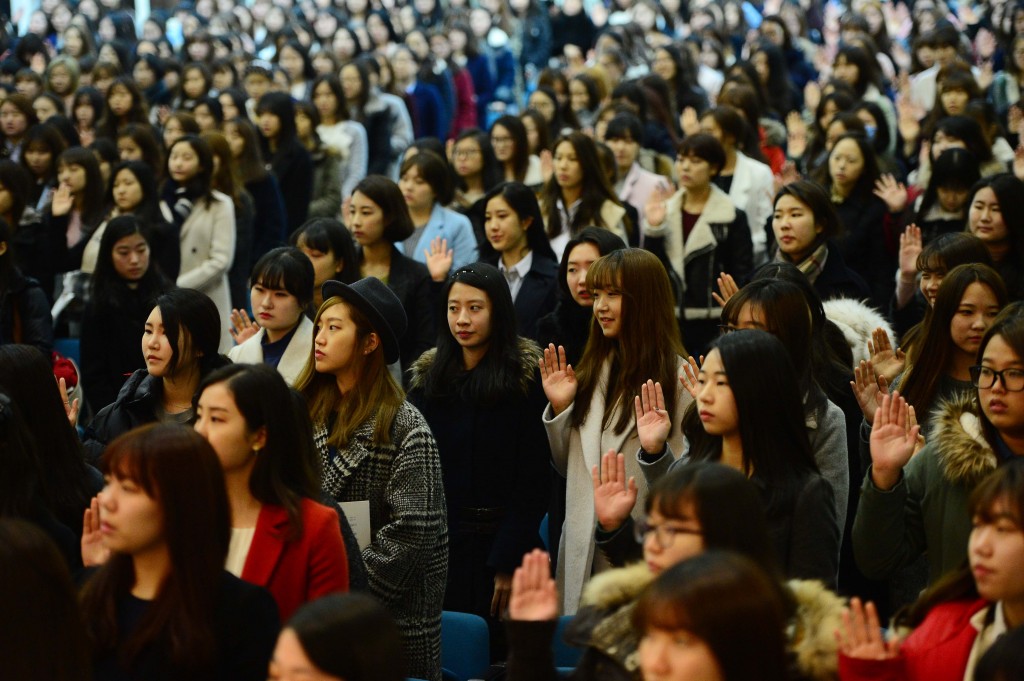- California Assembly OKs highest minimum wage in nation
- S. Korea unveils first graphic cigarette warnings
- US joins with South Korea, Japan in bid to deter North Korea
- LPGA golfer Chun In-gee finally back in action
- S. Korea won’t be top seed in final World Cup qualification round
- US men’s soccer misses 2nd straight Olympics
- US back on track in qualifying with 4-0 win over Guatemala
- High-intensity workout injuries spawn cottage industry
- CDC expands range of Zika mosquitoes into parts of Northeast
- Who knew? ‘The Walking Dead’ is helping families connect
Fewer foreign students choose Korean colleges
By Jung Min-ho
After the number of foreign students in Korea reached almost 90,000 in 2011, the Ministry of Education announced an ambitious plan the following year to raise that number to 200,000 by 2020.
Since then, the “Study Korea 2020 Project” has only proven to be an unrealistic goal as the numbers keep going down.
According to ministry data revealed Monday, the number of foreign students has decreased for three years in a row, from 89,537 in 2011 to 84,891 in 2014.
“The ministry is pushing a plan that has already proven to be a failure without changing strategies,” Rep. Jeong Jin-hoo from the minor Justice Party said. “To attract more students from overseas, the ministry should pay more attention to the quality of education rather than material benefits it could gain from them.”
Many foreign students and graduates from universities here point out that degrees from Korea are not helpful in getting jobs here and the job opportunities offered them are not enough.
“No matter what degree you earn here, it is very difficult to get a job other than teaching English,” a Japanese student, who studied at Yonsei University in Seoul, said on condition of anonymity. “So I decided to get a job in Japan.”
Many schools want foreign students to promote how “global” they are and to improve their international higher education rankings, experts say.
Foreign students can also help the schools fill the gap in the declining domestic college student population. The ministry said the number of high school graduates is expected to fall short of the college entrance quota from 2018.
Yet the ministry and universities have failed to prove the value of Korea’s higher education while simply recruiting them and offering more courses in English.
“Education degrees from Korea are not accepted in the United States or many other countries,” Nate Starun, an American who taught English here for the past five years, said.
“Korean work culture has a bad reputation for working too hard and too long. So I know some talented people who have had the opportunity to work here but decided to look for jobs elsewhere.”
Starun said he also decided to leave Korea this year to change his career to a web developer in the United States.
The pain of less foreign students is especially acute in schools outside Seoul. According to the ministry, the number of foreign students in Dongseo University and Busan University of Foreign Studies shrank to 109 and 90 last year from 274 and 238 in 2013, respectively.
Meanwhile, the number of foreign students at many schools in the capital city changed little, including Sungkyunkwan University from 1,164 to 1,391.
Given that more than 70 percent of foreign students come from China, Japan and Mongolia, observers say that the number of foreign students in Korea will keep deceasing unless the country offers something more for them.


















300-160 exam
October 31, 2017 at 11:13 PM
The pain of less foreign students is especially acute in schools outside Seoul. According to the ministry, the number of foreign students in Dongseo University and Busan University of Foreign Studies shrank to 109 and 90 last year from 274 and 238 in 2013, respectively.